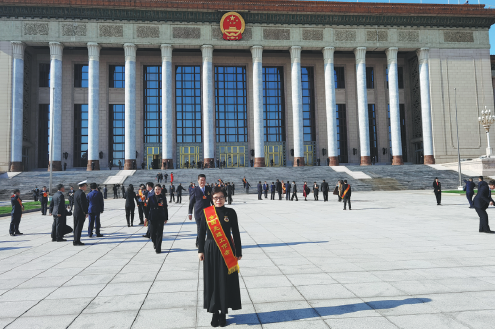Doctor dedicates herself to excellence


Model obstetrician nationally recognized for self-sacrifice and service to others over three decades
It is 12 midnight and Chen Aner receives a phone call from the hospital. One of her patients is about to give birth. She got up from the bed and rushed to the hospital.
She requested a car via a ride-hailing app. It took her 40-minutes to reach her destination.
Emergencies requiring an obstetrician have taken place thousands of times over the past three decades.
"This is the working reality," Chen said. "Women can give birth anytime, so you must be ready for your patients. It's unpredictable and requires a quick reaction."
Chen has been working at Ningbo Women and Children's Hospital in Zhejiang province since her graduation in 1991.
"I got sick easily when I was a kid, and was troubled by asthma," she said. "I guess I began longing to be a doctor to ease people's pain. It is a noble occupation."
Born in 1968, Chen thinks her generation is lucky.
"When we graduated in the 1990s, we were distributed to different medical institutions. At that time, we have more chances to operate. For me, I got the chance in just half a year."
Practice makes perfect
When she started her career as an obstetrician, Chen often performed cesarean sections and handled cases of babies out of position-ectopic pregnancies.
"In those first years, I kept a journal of every operation I did, and I thought about how to improve next time," she said.
Chen typically works from 7 am to 7 pm. However, she loses her sense of time frequently during work.
"I am a diligent person and don't care much about time, so long as I can learn something," she said. Chen often stays overtime to develop her skills in post-operative care and management.
In 2003, she became the director of an obstetrics department. And by 2016 she was managing eight different sub-departments.
"From 1991 to 2003, my main task was to improve my professional skills and knowledge. Since 2003, I had to also think about the development of our department and spend more time in management," she said.
Relationships with the patients are as important as professional skills for a doctor.
"When I started being a doctor, I often felt frustrated by the attitudes of the patients. Then I got to know the importance of communication between doctors and patients," she said, though she admitted she was not an expressive person back then. But being a doctor required her to develop communication skills.
Comforting people and listening to patients' worries and concerns is as important as providing treatment, she said. "It's better to comfort their feelings first; then you tell them the risks of the operation. This gives them time to accept the therapy."
Changes in equipment and technology in obstetrics and gynecology field have been dramatic over the past three decades. "For instance, now there are robotic operations and minimally invasive surgery. Skills involving intrauterine diagnosis are also improving, with low risk for the infant and mother."
Post-operative complications arise nevertheless.
"I guess because of the changes in our living conditions, complications after cesareans are more frequent than before, adding difficulty for doctors in making predictions and judgments," Chen said.
As a delegate of the Ningbo Committee of the Chinese People's Political Consultative Conference, Chen also make proposals based on her experience.
"In the case of Ningbo, the birthrate declined dramatically in 2020, not only because fewer people were getting married but also because of the economic burden of raising kids," she said.
To ease the concerns of parents-to-be, Chen thought the government should work harder on providing free nursery care services and extend paid maternity leave.
In recent years, in addition to providing four and a half days of outpatient services, Chen performs six to seven operations daily, up to 12 on a heavy day.
Teaching and remote diagnosis are also part of Chen's daily routine.
As an expert, Chen teaches medical staff from the Xinjiang Uygur autonomous region and Guizhou province, two regions assigned to Zhejiang for it to assist. Chen also needs to see patients from different counties in Ningbo.
"Sometimes when there are cases, I will need to go to the counties, even very late at night. And my husband will drive more than one hour to take me there."
Support from her family members also motivates Chen to keep digging in her field.
"My parents and parents-in-law are all government workers who understand my job duties and are supportive even when I am able to spend little time with my own family," she said.
In 2019, Chen's father-in-law was declared critically ill. However, she was not able to get to the hospital to help him because of an operation.
"I feel guilty not being able to meet him at the last minute, though my husband and my mother-in-law expressed their understanding," she said.
In November 2020, she was recognized as a National Model Worker at the Great Hall of the People in Beijing.
"Being a doctor is a process of constant learning," Chen said. "I hope those who choose this profession will follow their original inspiration and love it."
- China willing to carry out more intellectual property cooperation with other countries: vice-premier
- Comet C/2023 A3 seen above Great Wall in Beijing
- Beijing's growing appeal amid city's pursuit of high-quality development
- Combating disinformation on Xinjiang
- Xi congratulates Prabowo Subianto on assuming presidency of Indonesia
- Death toll rises to 9 in house fire in East China's Anhui





































